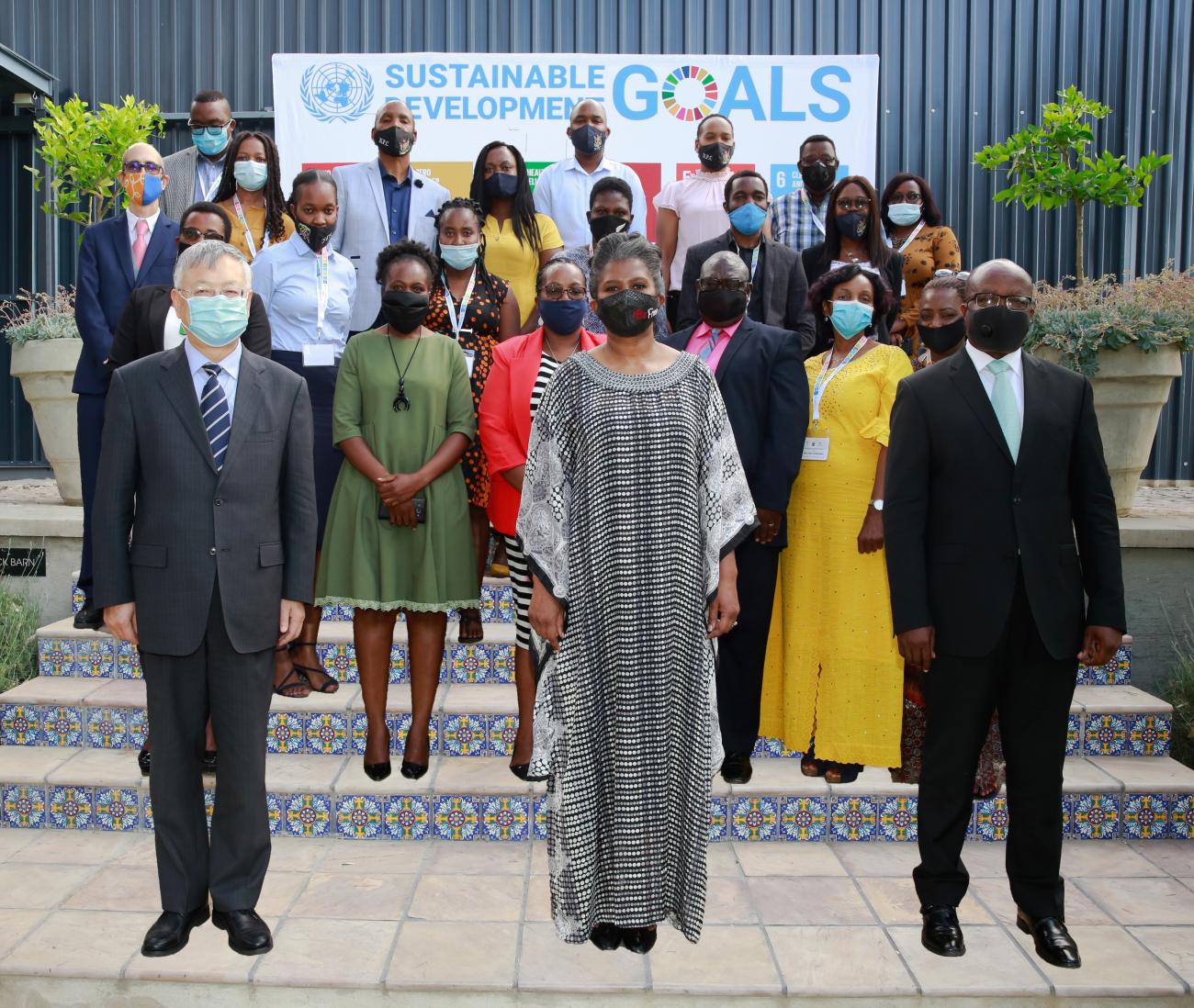Representatives from the Government of the Republic of Namibia and of the United Nations in Namibia inaugurated the capacity building workshop entitled “Public Policy Development, Review, Evaluation and Coordination for the Acceleration of the SDGs in Namibia”.
This three-day workshop, comprising of sixty-five participants was convened thanks to the collaboration between Namibia’s National Planning Commission (NPC), the United Nations in Namibia (UNN), the United Nations Department of Economic Affairs (UNDESA), and the German Cooperation Agency (GIZ).
At the opening session, participants were honoured with the presence of the First Lady of the Government of Namibia, Mrs. Monica Geingos; the Director of the National Planning Commission (NPC), Honourable Obeth Kandjoze; the Executive Director of the NPC, Ms. Wilhencia Uiras; the United Nations Resident Coordinator in Namibia, Mr. Sen Pang; the Chief - National Strategies and Capacity Building Branch at UNDESA, Mr. Amson Sibanda; and UNICEF Representative, Ms. Rachel Odede.
Mrs. Geingos in her remarks noted that: “the workshop is recognition that human capital is a transformative force when nurtured and developed ‘good policy is made and implemented by good people, for the good of the people’…government is a service industry that relies on its human capital to identify and solve society’s most complex problems.”
Honourable Kandjoze underlined the primary role of NPC, incuding among others reviewing public policies.
He argued that “with the challenges presented by COVID-19 and consequent change of environment, now was the opportune time to revisit a whole range of policies in place to assess whether indeed they remain fit-for-purpose.”
The Covid-19 pandemic and the global recession have placed important obstacles in Namibia’s path to achieve its development objectives, including those in the National Development Plans (NDPs), the Harambee Prosperity Plan (HPP), the joint United Nations Partnership Agreement Framework (UNPAF), the 2030 Agenda, and the African Union Agenda 2063.
Ms. Uiras emphasized that “consistency in the development of such policies and their effectiveness is critical in achieving the country’s developmental aspirations. Strengthening of the national policy coordination system will therefore prevent policy duplication, inconsistencies, contradictions and assist in identification of complementarities especially among sector policies.”
Mr. Sibanda expressed that “Planning institutions have a central role in mainstreaming and integrating the 2030 Agenda and the SDGs into national policy frameworks. Integration of the SDGs is a continual process. It entails shifting from a siloed approach to one that is informed by interlinkages between SDG targets. Additionally, the Agenda encourages Member States to conduct regular and inclusive review of progress at the national and subnational levels, including through the Voluntary National Review (VNR), to provide a solid baseline from which to assess gaps, challenges and progress.
Before the pandemic, Namibia was already dealing with challenges including poverty, inequality and the ongoing effects of climate change. Additionally, as a middle-income country, Namibia also faces significant hurdles accessing relief efforts that are critical to support a durable recovery. The combined impact of all these forces means that Namibia is currently off track in achieving the Sustainable Development Goals.
These difficulties have re-emphasised development planning and demonstrated the importance of putting in place strategies that prioritize job creation, the provision of quality education and health care, social protection, inclusive finance, and the empowerment of women and girls.
Indeed, Mr. Pang expressed that for years, there have been abundant theories and experiments about economic planning. A lot, for example, has been written about the success of the “East Asian Tigers” being attributed to planning. In Africa, countries including Ethiopia, Ghana and Nigeria, have development planning traced back as far as the early 1940s. Evidence suggests that Africa has experienced stronger growth and social development during periods characterized by planning.
This workshop’s programme through a hybrid format, consisted of an in-person gathering, benefiting from local and international expertise of UNDESA, UN Namibia, and UNECA, and other expert resource persons from academia, civil society, the public and private sectors.
Ms. Odede noted the spirit of partnership as a key ingredient that brought and held the team together.
“Partnership has enabled us to pool our resources, skills and expertise, in order to achieve our shared objectives. Partnership is the fuel that will keep us going, until the finish-line, in with SDG 17.”
“The series of training workshop are intended to support Namibia’s capacity building efforts for coherent, data-driven, evidence-based, consultative, and inclusive policymaking towards the achievement of the SDGs, related global frameworks and national development plans. Namibia has been privileged to pioneer this work with the UN Delivering as One, alongside the leveraging of related innovative modalities for delivery of capacity. The High-Level leadership to this end, has been commendable,” noted Ms. Eunice Ajambo, the Economist and Development Coordination Officer at UN Namibia, and the initiative’s Focal Point.




















